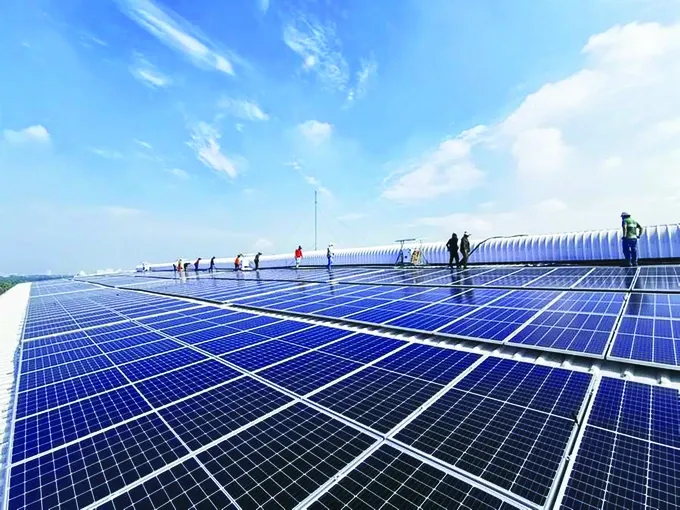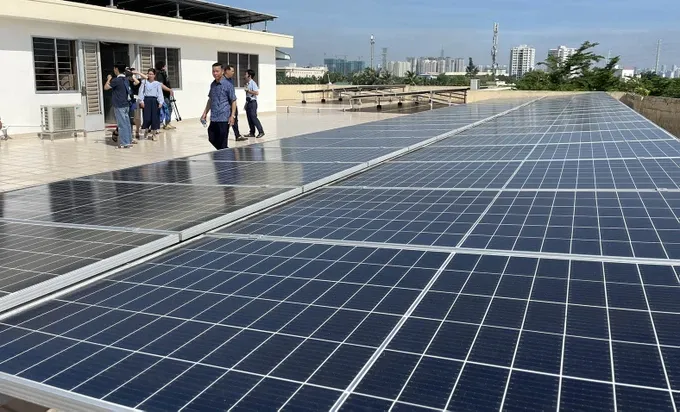
According to Decree 80, power can be purchased in two ways, either through a private grid connection or through the national grid.
In the first case, larger energy consumers sign a contract with renewable energy harnessing units to buy electricity via a dedicated line in compliance with the provisions in the Electricity Law (contracting parties, purpose of use, standards and service quality, electricity prices, payment methods, etc.). The electricity price will be negotiated between the two parties, except in some special cases.
Renewable energy generators can negotiate and sign power purchase agreements with the Electricity of Vietnam (EVN) or its authorized entity. Renewable energy harnessing units include solar power plants, wind farms, small hydropower plants, as well as biomass, geothermal, wave, tidal, ocean current, and rooftop solar systems.
Large electricity consumers are organizations or individuals that purchase electricity with an average monthly consumption of 200,000 kWh or more.
In the second case, renewable energy harnessing units sell all of their generated electricity into the day-ahead market of the competitive electricity market through a termed contract with large electricity consumers or authorized retail electricity entities in corresponding zones and clusters.
The latter will sign a power purchase agreement with EVN to purchase all the electricity they need. The day-ahead electricity market price is formed from the sum of the market electricity price and the market capacity price, as determined by the Ministry of Industry and Trade. Large enterprises can negotiate the electricity price directly, helping to optimize energy costs.
EVN Deputy General Director Vo Quang Lam affirmed that the approval of Decree 80 is a very important step to promote the development of the competitive electricity market. EVN has reviewed its internal procedures and will complete the mechanisms in accordance with the provisions of the decree and related regulations this July. On that basis, EVN and its member units, power trading corporations, can immediately implement the decree.
Chairman Nguyen Ngoc Hoa of the HCMC Businesses Association commented that the acceleration of the DPPA mechanism helps export-oriented enterprises access and use green-certified renewable energy for their goods earlier. This will in turn give them a competitive edge globally.

Director of Bincon JSC. Pham Phuoc Binh shared that the release of Decree 80 allows more convenient ways for businesses to access renewable energy and to mention the electricity grid when selling their goods. In addition, participating in direct power purchase helps energy harnessing units proactively find customers who need to buy electricity and regulate the grid more conveniently.
However, Director Binh noted that specific cost-related regulations need issuing, such as system dispatch, electricity loss rate, system operation, and maintenance, so that businesses can calculate investment costs. If this issue can be clarified, businesses will quickly invest given the fact that the electricity market is currently quite large and lucrative.
The Vietnam Energy Association stated that the Prime Minister’s approval of Decree 80 for the launch of the DPPA mechanism makes way for a competitive wholesale-retail electricity market instead of only EVN and its power distribution corporations as energy suppliers.
This mechanism also offers valuable opportunities for strong investment in the development of renewable energy sources, promote green production, and grant carbon emission reduction certificates to increase the competitiveness of goods when exported to international markets.
However, in the current context, the Vietnam Energy Association also recommends that whether direct (through a private grid connection) or virtual (through the national grid), direct power purchase agreements also create great pressure on the existing grid, forcing it to be balanced with the increasing amount of renewable energy. This calls for appropriate dispatch policies in line with the grid's load-bearing capacity.
Meanwhile, in order to prevent profiteering when renewable energy is bought and sold directly, Nguyen Thanh Hoai, an energy engineer, proposed that the authorities need to consider the optimal solution of building a mechanism for buying and selling electricity from storage systems.
This will ensure the stability of the national power system, as storage battery capacity is the best flexible power source to compensate for the power shortage of the power system when wind decreases (for wind power) or when it is cloudy, rainy, stormy and at night (for solar power system). This will help to reduce the investment in flexible power sources from the state budget, encourage and mobilize external capital sources for investment in renewable energy.
At a recent online conference in Hanoi to deploy Decree 80, the Ministry of Industry and Trade said that electricity consumers with an average monthly consumption of 200,000 kWh or more and who want to use renewable energy will be able to buy electricity directly from renewable energy producers under two forms of through a private grid connection or through the national grid.
In the latter case, renewable energy power plants (wind or solar power) must ensure a capacity of 10 MW or more connected to the national power system. In the former, there will be no limit on the capacity and type of renewable energy such as solar energy, wind power, small hydropower, biomass power, geothermal energy.
Minister of Industry and Trade Nguyen Hong Dien has requested Vietnam Electricity (EVN) and its subsidiaries to urgently calculate the costs of using the power system services in the DPPA mechanism, develop business and management procedures, and calculate payments and bills for customers when they participate in this mechanism.
























